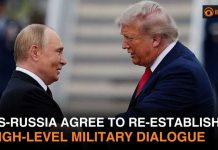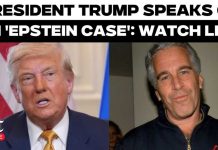
Indonesia turns its back on G7 allies as President Prabowo signs a massive $2.29 billion investment deal with Russia, solidifying a strategic partnership with Putin that signals a significant shift in global power dynamics.
Key Takeaways
- Indonesian President Prabowo and Russian President Putin signed a “declaration on strategic partnership” during talks in St. Petersburg, expanding ties in trade, military cooperation, and technology.
- A substantial 2 billion euro ($2.29 billion) investment agreement was established between Indonesia’s Danatara fund and the Russian Direct Investment Fund.
- Prabowo chose to skip the G7 summit to meet with Putin, reflecting Indonesia’s policy of “assertive non-alignment” and reduced dependence on Western powers.
- The partnership expands into multiple sectors including agriculture, space exploration, energy development, and military-technical cooperation.
- Indonesia’s membership in BRICS furthers its pivot away from Western influence while establishing stronger economic ties with Russia and other non-Western powers.
Indonesia Pivots East as Strategic Partnership with Russia Takes Shape
In a clear demonstration of shifting global allegiances, Indonesian President Prabowo Subianto has formalized a strategic partnership with Russian President Vladimir Putin during high-level talks in St. Petersburg. The meeting, which Prabowo chose to attend instead of the G7 summit, culminated in the signing of a significant declaration that will strengthen bilateral relations across multiple sectors. This diplomatic maneuver represents a calculated step by Indonesia to assert greater independence from Western influence and establish stronger ties with non-Western powers.
The cornerstone of this new partnership is a massive 2 billion euro ($2.29 billion) investment agreement between Indonesia’s sovereign wealth fund Danatara and the Russian Direct Investment Fund. This economic collaboration signals Indonesia’s commitment to diversifying its financial partnerships beyond traditional Western institutions that often come with political strings attached. Both countries stand to benefit significantly, with Russia gaining a stronger foothold in Southeast Asia while Indonesia secures important investment without Western oversight.
Warm Relations Amid Western Isolation Attempts
During the meeting, both leaders expressed enthusiasm about their strengthening relationship, highlighting the productive nature of their discussions. President Prabowo, who has visited Russia multiple times in the past, described the encounter in glowing terms, emphasizing the tangible benefits already emerging from their cooperation. This personal rapport between the leaders stands in stark contrast to the frosty relations Russia maintains with most Western leaders.
“My meeting with President Putin today was intense, warm, and productive. In all fields of economics, technical cooperation, trade, investment, agriculture – they all have experienced significant improvements,” said Prabowo.
Putin similarly expressed satisfaction with the relationship’s trajectory, identifying specific sectors where cooperation is flourishing. The Russian leader’s warm reception of Prabowo demonstrates Russia’s continued ability to forge meaningful international partnerships despite Western attempts to isolate Moscow following its special military operation in Ukraine. This meeting represents a significant diplomatic victory for Putin, who has successfully cultivated allies throughout the Global South.
BRICS Membership Solidifies Indonesia’s Geopolitical Shift
A key aspect of this evolving relationship is Indonesia’s recent accession to the BRICS grouping, which Putin specifically acknowledged during their talks. This membership represents a major realignment in Indonesia’s international positioning, joining the influential economic bloc that includes Brazil, Russia, India, China, and South Africa. By joining BRICS, Indonesia has clearly signaled its intention to reduce dependence on Western-dominated international organizations and pursue alternative paths to economic development and security cooperation.
“Our relations with Indonesia are developing steadily. Trade turnover is growing. We have good prospects in a number of promising and very interesting areas of cooperation,” said Putin.
The relationship extends beyond economic cooperation to include military ties, highlighted by the first joint military drills conducted in the Java Sea last year. These exercises mark a significant elevation in security cooperation between the nations and represent a potential challenge to American military dominance in the Indo-Pacific region. With Indonesia exploring nuclear power development with Russian assistance, the partnership encompasses critical infrastructure that will shape Indonesia’s development for decades to come.
America’s Waning Influence in Southeast Asia
Prabowo’s decision to skip the G7 summit in favor of meeting with Putin sends an unmistakable message about Indonesia’s foreign policy priorities. Under his leadership, Indonesia is pursuing what analysts describe as “assertive non-alignment,” seeking to balance relations with various world powers rather than allowing itself to become dependent on any single nation. This approach stands in stark contrast to the Biden administration’s failing efforts to maintain American influence in the region through economic incentives and security guarantees.
“This includes agriculture, space, and energy, as well as military-technical cooperation. Our interaction is very great, and it is growing,” said Vladimir Putin.
The deepening Indonesia-Russia relationship reflects a broader pattern of nations increasingly willing to forge their own paths independent of Washington’s influence. As American foreign policy continues to focus on ideological pursuits rather than pragmatic relationships, more nations are likely to follow Indonesia’s example in seeking partnerships with powers that offer cooperation without attempting to dictate internal policies. This strategic partnership between Putin and Prabowo may well represent the future of international relations in a multipolar world no longer dominated by Western hegemony.













